Five years of the penitentiary medicine reform: a sad anniversary

The penitentiary reform, according to the passport approved by the Ministry of Justice, began in 2017 and was supposed to end this year. At least, that’s what they say. Since even searching for the Passport itself in the open access is out of the question. The pride of the Ministry of Justice, the document developed in a “unique schematic format”, thanks to which we would be able to compare the planned with the implemented, is apparently classified. From what we were able to discover in free access in the network, without sending the information requests to various institutions, there are several old screens from the Twitter account of the Ministry of Justice.
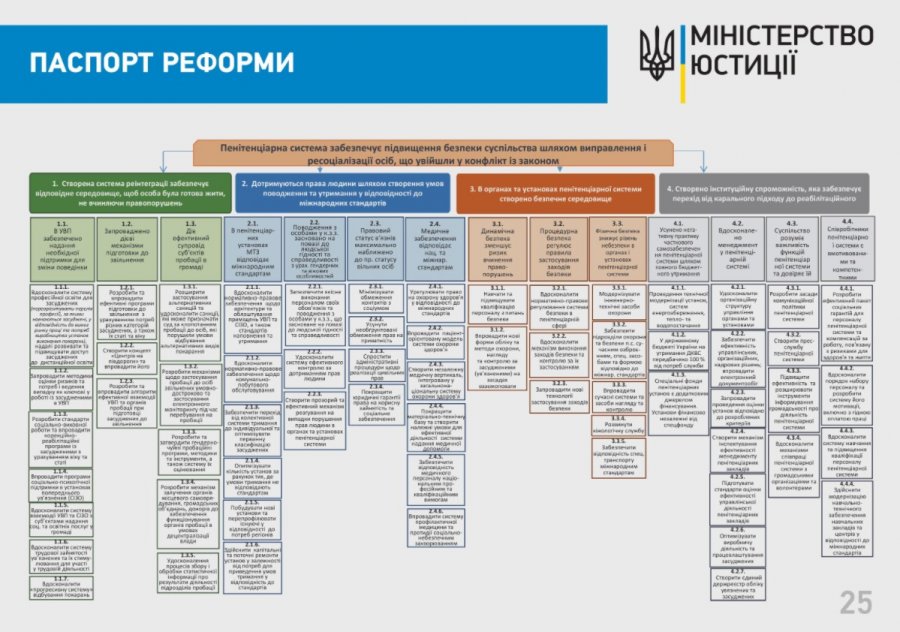
It would be nice to see the specifics: the planned funding, procurements, real means of improvement of the situation. But we only have “column 2.4” in the pretty presentation. It directly concerns penitentiary medicine – the general strategic goals, nothing specific. So, according to the Passport of the penitentiary reform, by this moment the following changes were to be implemented in the system:
– the right (of the prisoners) to medical assistance is regulated according to the international standards;
– the patient-oriented model of the health-care system is implemented;
– the new medical vertical integrated in the general national health care system is created;
– the material and technical base is improved and the proper conditions for efficient provision of medical assistance are created;
– compliance of medical staff with national professional and qualification requirements is ensured.
Spoiler: according to our observations, none of those noble goals is reached.
We should remind here that at first the health care institutions of SCES were planned to be transferred to the Ministry of Health, which would be logical. But later that idea was lost somewhere. The prison health care was directly subordinated to the Ministry of Justice. After that the numerous medical units lost the financial support from the institutions in which they worked (in the penal institutions where economic activities were conducted, such assistance was significant for medical units), and did not enter the general national health care system.
The hospitals dangerous for life
Two years ago the monitoring group of KHPG visited Lviv General Hospital No. 19 of the MD of HC of SCES. This is where oncology prisoners from all Ukrainian institutions are transported. The detention conditions for the patients back then were simply appalling: the cells had mould, exposed wires, shredded mattresses, broken windows, the “hole in the floor” toilets separated by dirty rags. Back then it was possible to say that it was a transitional stage of the reform and it would improve.

It did not improve. August 2021. Monitors visit the hospital again. What do they see? The same mould, cockroaches, exposed wires and boilers in plastic buckets.
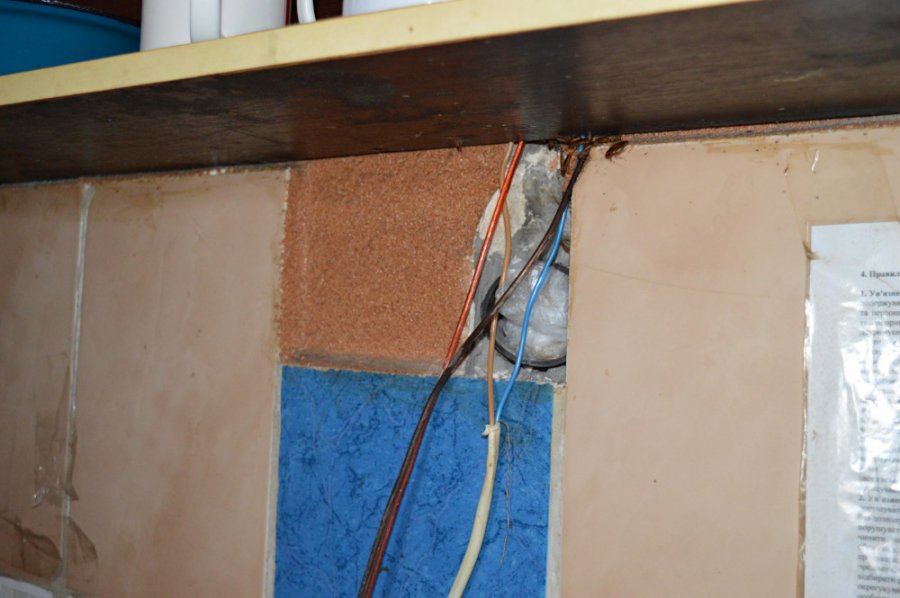
Cancer surgeries are performed at the hospital, but relatives of convicts are often forced to buy chemotherapy drugs at their own expense, and radiation therapy has not been used since the early 2000s. The institution does not have its own CT or MRT machine, say the monitors, and conducting such studies in MoH hospitals is complicated by a lack of funding and sometimes the reluctance of the MoH hospitals to interact with penitentiary institutions. We would reiterate that we are talking about the hospital which specializes in oncology. Without their own CT, MRT and radiation therapy.
Human rights defenders visited the Dnipro Inter-regional General Hospital No. 4 on 10 November of this year. The detention conditions of the patients are also appalling here. The same sockets falling out of the walls, posing a fire danger, dirt, unsanitary conditions. It is unclear how the people are even treated here: “Dozens of surgeons work at the general hospital, however, the institution does not have the permission for the use of narcotic painkillers. Thus, the surgeries are not conducted, and the operating room was re-equipped as an isolation ward. Only the basic surgeries that do not require the painkillers are conducted. The institution does not even have a full-time anaesthesiologist. Thus, it is unclear why the wages are paid to dozens of surgeons. The convicts only have a chance of undergoing a surgery in case of their transfer to the “civilian” hospitals of the Ministry of Health, to which only the convicts with money or relatives willing to pay for their treatment can get. Other convicts are forced to die in the general hospital”. It is obvious that the introduction of the “patient-oriented model of the health care system” announced in the Passport failed in the SCES. Same as the “compliance of the medical staff with the national professional and qualification requirements”.
European-style treatment
The quality of the reform of the entire penitentiary system can be judged by individual stories of real people. Sick people who have to fight for the right to medical care.
We have written about the prisoner of Kryvyi Rih penal colony No. 80 three times already. The first material was published a year ago and was titled “Saving A’;s foot”. It was not saved. Despite the publicity and the active position of the lawyer.
At the beginning of last year, A. appealed to the Centre for Strategic Protection: he was not treated, and documents on his release for health reasons were not submitted to the court. The list of the diagnoses is long: HIV, chronic hepatitis, the third group of visual disability. But most of all at that time he suffered from obliterating atherosclerosis of the vessels of the lower extremities – his feet ached, were numb, stained. The man had already lost one finger at that time, so he was afraid that others would also be amputated.
In order to receive the medical information about her client, the lawyer in three months had to send several requests to the medical unit, to the branch of the MD “HC of SCES” in Dnipropetrovsk and Donetsk regions, to the inter-regional hospital in SI “Dnipro penal colony No. 4”. Without effect. The lawyer filed a complaint about the crimes of the responsible persons of these institutions with the Prosecutor's Office of Dnipropetrovsk region.
– I applied to the court with a petition about the obligation of the responsible persons of the colony № 80 to provide the necessary treatment to my client, – said then the lawyer, Tamila Bespala. – Even before appointing the court hearing my client was brought to the hospital in Dnipro penal institution No. 4. Although he was recently treated there and he was directly told that nobody will treat him there for free and he needs to be placed in a civilian hospital. My client happily notified me that the doctors started treating him, making the injections, administering drips, allegedly preparing him for the surgery which will allegedly take place not in an institution of SCES, but in the Dnipropetrovsk Regional Mechnikov Clinical Hospital. Hoping for the happy outcome of this story concerning the treatment, I filed the application to court about leaving my previous application without consideration.
10 days after the happy call the client called the lawyer again. The doctor notified the prisoner that “his treatment was finished with the injections, but there can be no toying around, because it could lead to the loss of feet”. Dnipropetrovsk Regional Mechnikov Clinical Hospital refused to accept the prisoner for the surgery. They said, there were no available places. Instead of searching for another hospital where vascular operations are performed, А. was forced to sign… “Refusal of treatment due to inability to provide him with medical care”.
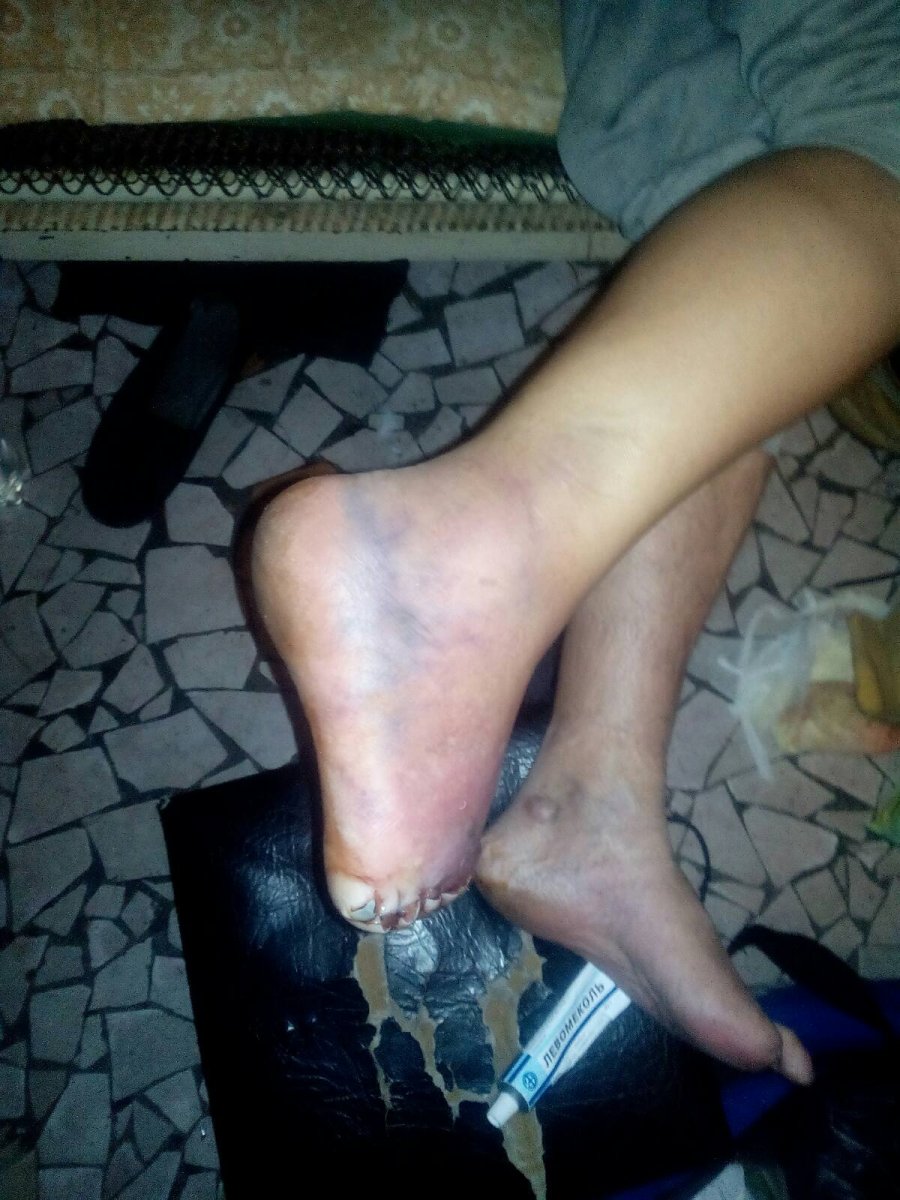
Meanwhile, the court hearings on A.’s release were postponed for two months due to his health condition. A.’s toes started going black. The lawyer added the petition on providing medical assistance to her client. The result was the amputation. This story is a great illustration of how HC of SCES adheres to the right of the prisoners to health care according to the international standards.
By the way, the court did not release A. on health grounds.
* * *
In order for a sick prisoner to be treated, a lawyer needs his client’s medical records. But receiving it from medical institutions in the penitentiary system often turns into a real quest. They do not answer inquiries, refer to medical secrecy, “football” the requests to other institutions. One could wait months to receive the necessary documents. Sometimes nothing happens without a complaint and a statement to law enforcement bodies and the court.
Moreover, sometimes the administration of the institution simply blocks the communication between the lawyer and the sick client. It happened, for example, this year in Dnipro colony No. 89, where a fourth-degree HIV and tuberculosis patient, N., who was entitled to release due to a serious illness, turned to a lawyer. In August, the lawyer sent the man the documents to sign, necessary for the case. N. never received the letter. Neither did he receive the next few letters. Only after the lawyer’s complaint to the South-Eastern Penitentiary Department did N. receive his correspondence.
* * *
A prisoner of Vinnytsia colony No. 86 was almost left without legal assistance by deception. I. is a : he suffered a stroke, a half of his body is paralyzed, he is bed-bound. Release on the grounds of health? No way! It is almost a detective story.
He turned to the KHPG for protection. The day before the lawyer’s request for his release, I. suddenly refused her services: the colony’s management promised to do it alone. However, provided that he does not cooperate with the defender.
In a year the monitoring group of KHPG visited the colony. The human rights activists inquired about the fate of the former client. It turned out that all this time (more than a year) the patient was lying in the basement, he was strictly forbidden to contact KHPG. Apparently, this is an example of the appropriate conditions for effective medical care activities stated in the Passport of Reforms.
After the monitors’ visit, I. was allowed to communicate with lawyers again. During the year in the basement, the number of his diagnoses increased, so the lawyer began to fight for his early release due to ill health and went to court.
In the meantime, I. was transferred to five different institutions. He had another stroke. The court hearings were postponed for more than six months. And really, where to hurry? During one of the meetings, when I. was carried on a blanket to the video conference room, he was simply dropped on the stairs between the floors.
Despite all the reassurances and the opinion of the consultative medical panel, Vinnytsia city court... refused to release I. The Court of Appeal upheld the decision. Now I. is in the Vinnytsia correctional colony. He was not even transferred to a specialized institution for the disabled.
The system humiliates the diseased. Often the medical secrecy concerns... the patients themselves: the prisoners are not told about their real diagnoses. The lawyers also have to fight for that.
What is wrong with the system?
In general, human rights activists consider the problems of penitentiary medicine to be the most acute:
• “Imaginary independence” of health workers from the administration of the colonies (health care facilities are located on the territory of the relevant institutions, and therefore should be subject to the administration on compliance with the regime, supervision over the prisoners and security, their leaders are present at operational meetings held by the heads of the institutions, they must apply to the administration of the institutions with requests for the export of convicts to civilian health care facilities, the use of vehicles for this purpose);
• insufficient medical stuffing;
• the lack of medicines, law quality of medical treatment;
• non-transparency of the work of the Health Centre;
• low quality of medical documentation;
•impossibility of early release even for the seriously diseased convicts.
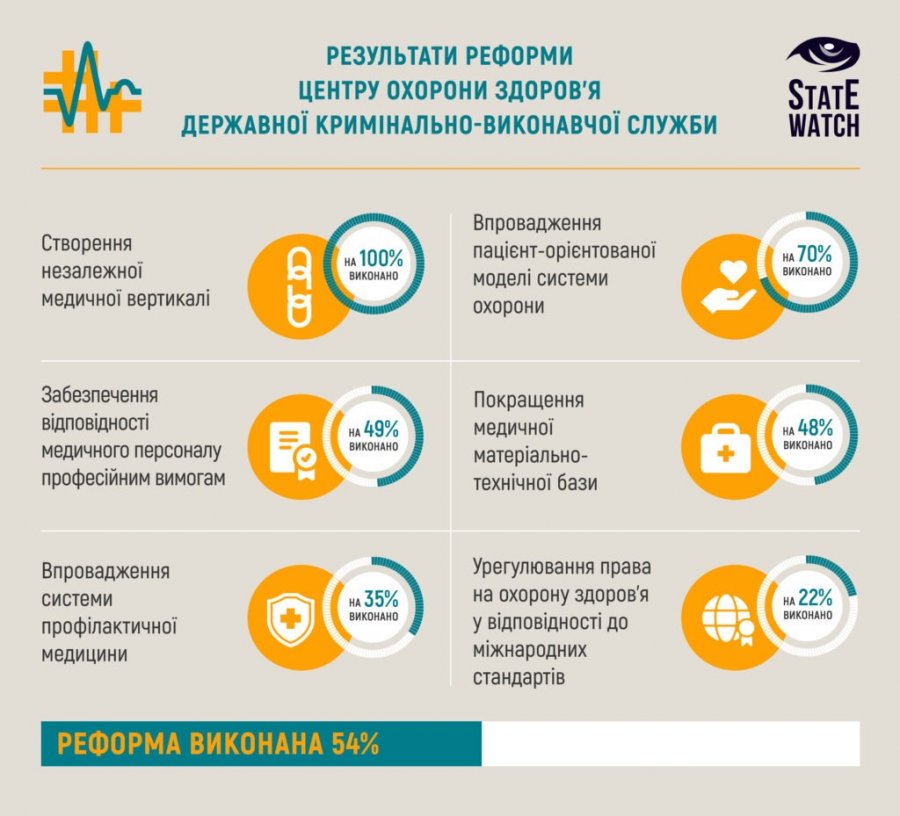
Recently the StateWatch (a non-governmental organization that approves the principles of Good Governance in the work of the authorities) published the results of the audit of the efficiency of the use of state budget funds sent to the state institution “Health Centre of the State Criminal Executive Service of Ukraine” for the period 2018 - the first half of 2020, conducted by the Accounting Chamber. The opinion of the StateWatch – the reform of the penitentiary medicine failed.
In general, it turned out that the audit is pretty hard to perform. “The lack of approved plans of implementation of the Passport of penitentiary system and probation reforms with indication of planned indicators makes it impossible to control the full and timely manner of carrying out of measures of HC of SCES entrusted to it by the Ministry of Justice”, – state the auditors. The fact is that the plan of implementation of the Passport of Penitentiary System and Probation Reforms with the indication of targets was not officially approved by the Ministry of Justice, and information on the implementation of reforms within the competence of the HC of SCES was provided to the head of the Ministry of Justice…in the form of the presentation with descriptive part.
The auditors received more or less accurate data only as of August 2019. Apparently, it was then that the HC of SCES last reported on the state of implementation of the reform.
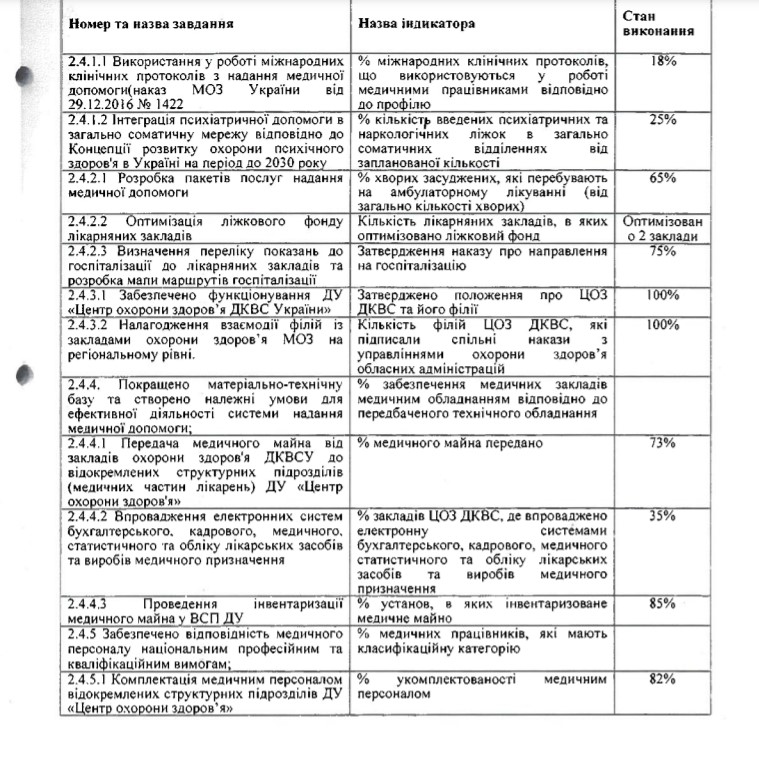
In addition, the auditors of the Accounting Chamber paid their attention to the signs of corruption in the procurement of medicines. “Health Centre conducted the tender on procurement of hepatitis medicines by increased prices comparing with the Register of Wholesale Prices for Medicines of the Ministry of Health. The need for procurement was overstated by UAH 53.7 million”, – states the report of the StateWatch.
Can this be treated?
It cannot be said that doctors working in the penitentiary system do not treat anyone. There are recoveries, there are lives saved. But they are lost against the general background of systematic human rights violations, the lack of medicines and equipment, the fatigue and indifference of staff forced to work in such conditions.
“State Criminal-Executive Service cannot cardinally change the conditions of detention with that severely lacking budget funding that is provided. The prison medicine system needs to be radically reformed and subordinated to the Ministry of Health, without which talking about any improvement in medical services in penitentiary institutions is out of the question”, – believes Yevgeniy Zakharov, the director of Kharkiv Human Rights Protection Group.
However, the process of transition of the Health Centre of SCES from the Ministry of Justice to the Ministry of Health has slowed down in the pre-pandemic times. Not only are both ministries now actively reforming, but the fight against COVID-19 is also diverting significant resources from the Ministry of Health. However, it is absolutely necessary to change the system. And the pandemic is one of the reasons. Prisoners also suffer from coronavirus. Human rights activists have many questions about how prison medicine fights the spread of the disease. They complain about insufficient testing, lack of protective equipment, drugs, premises for isolation, refusal to conduct temperature screening.
In October, the Verkhovna Rada registered the bill No.6141, the authors of which suggest to provide convicts with the opportunity to be treated in Ministry of Health facilities and use the services of family doctors.
– An unrealistic idea, in my opinion, – believes Yevgeniy Zakharov. – many colonies do not even have access to internet, and in pre-trial detention centres the E-health cannot be implemented at all. In fact, the decision to transfer prison medicine to the Ministry of Health seems to have been approved in principle. But only in words, no real steps are being taken. The authorities do not have the will to decide anything. The working group set up by the relevant parliamentary health committee met several times before the parliamentary holidays, but never in autumn. Meanwhile, in the draft budget for next year, funds for penitentiary medicine are planned for the Ministry of Justice. They will not be enough again. We are preparing the amendments to the regulatory acts on transfer o the HC of SCES to the Ministry of Health, based on the idea of creating a separate relevant unit in the Ministry of Health, headed by the Deputy Minister. In any case, the situation is critical. We need to talk about it, write about it, change something.
We would recall that in December last year the Cabinet of Ministers of the Council of Europe considered the situation with Ukraine’s implementation of the European Court of Human Rights’ decisions on inadequate medical care, inhuman and (or) degrading treatment in places of detention. The Committee of Ministers noted with concern that a lasting decision had not yet been taken to address the shortcomings of the Ukrainian prison system: overcrowding, poor material conditions of detention and transportation, inadequate medical care in remand centres and penitentiaries. In addition, the Committee of Ministers of the Council of Europe has decided to conduct a separate monitoring of measures taken by the government regarding access to health care for prisoners.





